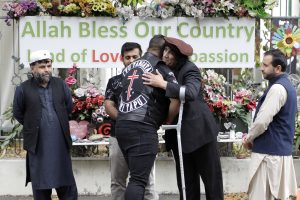People in the New Zealand city of Christchurch honored the 51 worshipers who were killed in a mass shooting a year ago in small but poignant ways Sunday, after a planned national memorial event was canceled due to fears it might spread the new coronavirus.
Prime Minister Jacinda Ardern said Saturday the decision to cancel the memorial event planned for Horncastle Arena was pragmatic and precautionary.
New Zealand has had eight confirmed cases of COVID-19. All of those cases have been connected to people returning from abroad and so far there haven’t been signs of a local outbreak. Ardern has enacted strict border rules in an attempt to prevent the disease from taking hold in New Zealand.
Outside the Al Noor mosque on Sunday, dozens of leather-clad bikers from the Tu Tangata club performed a traditional Maori haka. They were welcomed by mosque imam Gamal Fouda, who said people of all beliefs and cultures were stopping to pay their respects, and they were all united as New Zealanders.
One of those who survived the shooting at the Linwood mosque was Mazharuddin Syed Ahmed, who said that marking anniversaries was not typically a Muslim tradition but they were doing it so the wider community could grieve and remember. He said the shootings had provoked an outpouring of love and compassion.
“Of course, we lost our loved friends, family, people and community,” he said. “But we are also seeing so much good has come out of it. So looking at the positive part of that. Today, it is such a privilege to be in this country.”
Temel Atacocugu, who survived after being shot nine times at the Al Noor mosque, said the anniversary had provoked strong feelings.
“We are sad more than we are angry,” he said. “It’s very emotional. When I woke up this morning, I’m speechless. I can’t explain what I feel.”
Ardern said Friday that New Zealanders have become more engaged with the Muslim community in the year since a gunman killed 51 people at two mosques.
Ardern was in Christchurch attending events to mark the anniversary of last year’s March 15 massacre, which she has described as one of New Zealand’s darkest days. On Friday she attended a special joint prayer with members of both mosques that were attacked.
Among those speaking during the prayer service was Al Noor mosque survivor Farid Ahmed, whose wife Husna was killed in the attacks.
“Hate does not achieve any gain for the hater, or for anyone,” he said afterward. “If there are any differences, there is another way, and that way is the peaceful way. We should talk, we should dialogue, we should ask one another questions, and we should not be afraid of one another.”
Ardern said people had told her they had visited mosques for the first time in the wake of the attacks and had found themselves more openly discussing differences of faith.
“A year on, I believe New Zealand and its people have fundamentally changed. I can’t see how you could have an event like this and not,” Ardern said. “But the challenge for us will be ensuring that in our everyday actions — and in every opportunity where we see bullying, harassment, racism, discrimination — calling it out as a nation.”
Ardern drew attention to laws changed in response to the attacks. The deadliest types of semi-automatics are now banned, and in a nationwide buyback, gun owners turned in about 60,000 of their newly outlawed weapons for cash.
She also talked about her work on trying to eliminate terror attacks from being shown online, after the gunman livestreamed the Christchurch attacks. Ardern brought some nations and tech companies together to work on the issue in what she named the Christchurch Call, which she said had helped start a new crisis response protocol.
“As a result of the protocol and that coordination in those events where social media platforms have been used to broadcast attacks, the circulation of those videos had been far, far diminished,” she said.
Ardern’s empathetic response after the attacks and her message of unity resonated around the world last year. Images of her wearing a hijab and embracing members of the Muslim community created a lasting impression for many.
The man accused of the attacks, 29-year-old Australian white supremacist Brenton Tarrant, is due to stand trial in June on charges of terrorism, murder, and attempted murder. If found guilty, he would face a sentence of life imprisonment.
By Nick Perry for The Associated Press.

































